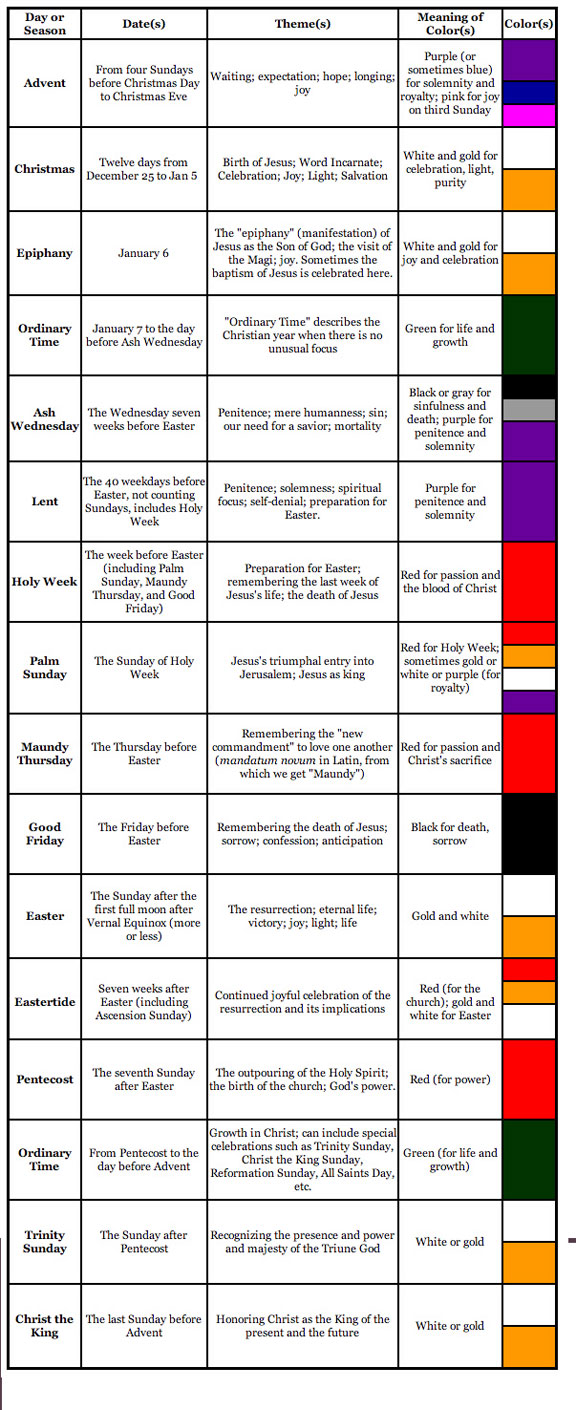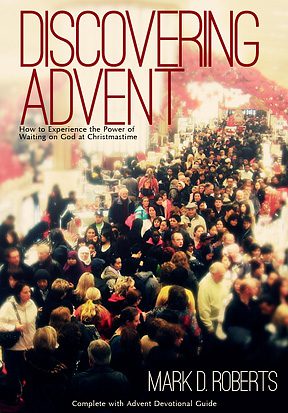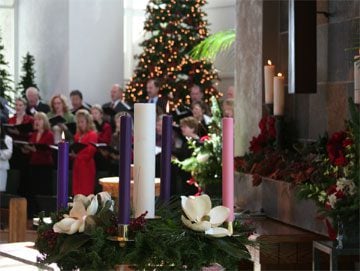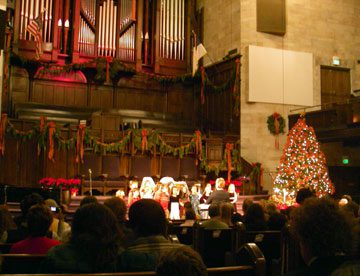Tomorrow is the first day of Advent. In yesterday’s post, I encouraged you to get ready for Advent. Today, I want to think with you about the broader context in which Advent makes sense.

Today is the last day of the Christian Year, also known as the Liturgical Year or the Church Year. For those who follow the Christian Year, the latest one began last year on December 1, which was the first Sunday of Advent. We have moved steadily through Advent, Christmas Day, Christmastime, Epiphany, Ash Wednesday, Lent, Palm Sunday,Holy Week, Maundy Thursday, Good Friday, Easter Sunday, Eastertide, Pentecost, Trinity Sunday, Christ the King Sunday, and a number of other holy days. The bulk of the year is Ordinary Time, not in that it is plain vanilla, but because it is “ordered.”
Should you care about any of this? Does it really matter?
Ever since I have been writing about aspects of the Christian Year, I’ve been getting questions like this. Sometimes, people are genuinely curious. Sometimes, my interlocutors are critical, believing that I have lost touch with biblical faith and have fallen into some sort of high-church, traditionalist pit.
Let me begin my answer to the “Should you care?” question by noting that nothing in Scripture requires a Christian to pay attention to the Christian year. Nothing in Scripture necessarily prohibits it, either. One might argue on the basis of the Old Testament festivals that God wants us to structure our year theologically with various holy days. But, another might respond that these festivals were part of the Old Covenant and aren’t relevant for Christians. I think Paul has given us definitive guidance about such things in Romans 14:5-6a: “Some judge one day to be better than another, while others judge all days to be alike. Let all be fully convinced in their own minds. Those who observe the day, observe it in honor of the Lord.” This suggests that Christians are free in Christ either to set aside certain days as holy days or not to do so.
Freedom in Christ. This is key. If ever we turn our rituals into some sort of legalism, if ever we suggest that “real Christians” will do extra things, then we run a serious risk of turning the Christian life into a matter of obligation rather than living in the flow of God’s grace. Nobody should keep the Christian Year as a way of trying to earn that which God gives us freely through Christ.
But, there are many people, and I would now number myself among them, who have found in the Christian Year a way of experiencing God’s grace more profoundly. I would never say that all people should do as I do. But I do in fact believe that many Christians would find it helpful to structure their years according to the Christian calendar.
This calendar, by the way, is built upon the person and work of Jesus Christ. Here are some examples of what I mean:
Advent: We prepare to celebrate the first coming of Christ and anticipate his second coming.
Christmas: We celebrate the Incarnation of the Word of God, the birth of Jesus the Savior.
Epiphany: We remember the revealing of God through Christ to the whole world.
Ash Wednesday: We are reminded of our great need for a Savior.
Lent: We focus on the life of Jesus in preparation for Holy Week.
Palm Sunday: We celebrate the triumphal entry of Christ into Jerusalem.
Maundy Thursday: We remember Jesus’ foot-washing and his command to love.
Good Friday: We worship Jesus who gave his life on the cross for us.
Easter: We celebrate the resurrection of Jesus and the victory of God.
Christ the King Sunday: We worship Jesus as King of kings and Lord of lords.
If we rightly understand the Christian Year, we will see it as a way to structure our lives in light of the life, ministry, and lordship of Jesus.
You might be wondering, “But why do I have to structure my life in any particular way? Why can’t I just live each day for God’s glory?” You can, thanks be to God. But, in fact, all of us have our lives structured by our culture, traditions, and personal inclinations. For example, many of us experience life primarily in terms of the school year. We think of life as divided up into “the school year” and “the summer.” Others see life in terms of the fiscal year, with key IRS reporting dates giving structure to their internal and shared lives. Still others think in terms of “regular working life” and “vacation.” Perhaps the majority of people order life according to the secular calendar (We’re now in 2014) or the seasons (winter, spring, summer, fall).
If it’s true that we will structure our lives somehow, then why not by the life and work of Christ? Why not begin to think of the first Sunday of Advent as the first day of the year?
Again, I’m not saying that all Christians must do this. I am saying that there is no strong reason not to do it, and, in fact, plenty of reasons to do it. For me, I’d rather think that my year begins by focusing on the coming of Christ than by waiting for some blazing crystal ball to descend in Times Square. I’d rather start my year by lighting a candle to kindle my yearning for Jesus than by yelling “Happy New Year” and then watching a bunch of football games (which I do on January 1, quite happily, I might add).
If you’re interested in the Christian Year but looking for more information, you might find helpful a blog series I’ve written called:
Introduction to the Christian Year
What is the Liturgical Year or Church Year?
How Can it Make A Difference in Your Relationship with God?
And if you’re eager to start living according to the Christian Year by celebrating Advent, let me once again provide links to more information about Advent. These are the same links that appeared in yesterday’s post.
At any rate, as we come to the end of this year, may we give thanks to God for his blessings in the past and prepare our hearts to rekindle our yearning for him as the new year begins tomorrow with Advent.
Resources for Advent
What is Advent? An Introduction to Advent
My blog series covers the basics of Advent: its meaning, traditions, and spiritual purpose.
Advent Devotional Guide: Preparing for the Coming of Christ
This devotional guide is meant for individuals, families, groups of friends, or worshiping communities. It uses an Advent wreath, and contains Scripture readings, prayers, and basic explanations.
 Discovering Advent: How to Experience the Power of Waiting on God at Christmastime
Discovering Advent: How to Experience the Power of Waiting on God at Christmastime
My new e-book tells the story of my personal discovery of Advent, something Christians have been celebrating for centuries, but which has been a relatively new addition to my life. As I share my story, I explain the meaning, traditions, and purpose of Advent. I suggest ways you can grow closer to God in Advent as you wait upon him. I also deal with specific questions such as: Is Advent biblical? Discovering Advent also includes an Advent Devotional Guide for personal, family, or group worship.
Kindle edition – $2.99 · · · · · ·Nook edition – $2.99
Given the fact that I have lots of free material about Advent on my blog, you may be wondering about the benefit of purchasing Discovering Advent. In truth, the basic material on my blog is quite similar to that in the e-book. After all, Advent is Advent. But the e-book is a thorough rewrite of everything I have previously written, with some new material added. If you have a Kindle or Nook, I think you’ll be happy that you bought Discovering Advent.











